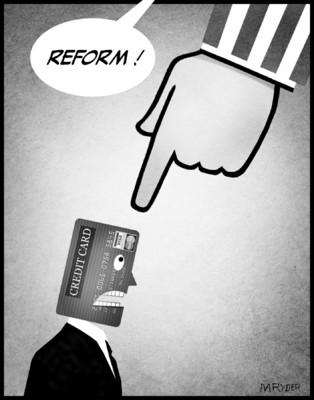- MENU
- HOME
- SEARCH
- WORLD
- MAIN
- AFRICA
- ASIA
- BALKANS
- EUROPE
- LATIN AMERICA
- MIDDLE EAST
- United Kingdom
- United States
- Argentina
- Australia
- Austria
- Benelux
- Brazil
- Canada
- China
- France
- Germany
- Greece
- Hungary
- India
- Indonesia
- Ireland
- Israel
- Italy
- Japan
- Korea
- Mexico
- New Zealand
- Pakistan
- Philippines
- Poland
- Russia
- South Africa
- Spain
- Taiwan
- Turkey
- USA
- BUSINESS
- WEALTH
- STOCKS
- TECH
- HEALTH
- LIFESTYLE
- ENTERTAINMENT
- SPORTS
- RSS
- Personal Finance
Credit Card Accountability, Responsibility and Disclosure Act passed by Congress
Humberto Cruz

If you have $10,000 in credit card debt at 18 percent interest and send just the minimum payment of 2.5 percent of the balance each month, it would take you more than 30 years to pay it all off.
And by the time you are done, you would have forked over $14,587.62 in interest.
Cardholders who carry a balance tend to be shocked by numbers like these. They shouldn't be, with many credit card calculators readily available online (I used the calculator at the consumer site www.bankrate.com, first clicking on calculators, then on credit card.)
Even with just pencil and paper, you can get a good idea of the potentially devastating long-term cost of credit card debt.
For example, on a $10,000 balance at 18 percent interest, the annual interest would be $1,800 (18 percent of $10,000). So for one month the interest would be about $150 ($1,800 divided by 12, since there are 12 months in a year).
Therefore, if you send a $250 minimum payment when you owe $10,000, only $100 goes to reduce the principal balance, which dips to $9,900. The next minimum payment would be $247.50 (2.5 percent of $9,900). Of that amount, $148.50 would be interest (18 percent of $9,900 divided by 12) and just $99 would reduce the balance, which becomes $9,801. And so on.
My point: You don't need to wait for the credit card companies to tell you the interest cost of making just the minimum payment and how long it will take you to pay off the balance. Card issuers will be required to disclose this information beginning next year under the Credit Card Accountability, Responsibility and Disclosure Act passed by Congress in May
The wide-ranging legislation, most of which takes effect at the end of February, prohibits credit card companies from raising interest rates on your balance unless you are more than 60 days late on your payments to them. In that case, you will be able to get back your original rate by making payments on time for six months in a row.
The law also bans "double-cycle" billing or charging interest on a portion of a balance that is paid by the due date. It requires payments to be applied first to that part of the balance, if any, with the highest interest rate.
While these are all welcome changes, they won't affect people who pay their balances on time and in full, which I hope is what readers of this column always do.
If anything, this group that handles credit most responsibly may be hurt as more credit card companies impose annual fees and scale back rewards programs to make up for lost revenue under the new law.
"They (credit card issuers) are not philanthropic organizations - they are out to make as much profit as possible," said Bill Hardekopf, CEO of LowCards.com (www.LowCards.com), a Web site where consumers can compare cards. About 20 percent of cards charge an annual fee now, Hardekopf said, and he expects the number to go up in the next year. Meanwhile, rewards programs already have begun changing for the worse.
Hardekopf's advice: Pay attention to your rewards by looking at the terms and conditions on your card. Issuers can make subtle changes that are hard to spot, such as changing the amount of purchases needed to reach a certain rewards payout. While there will still be good credit cards available, consumers will need to be diligent in searching for a good deal, he said.
Personal Finances - Credit Card Accountability, Responsibility and Disclosure Act passed by Congress
© TRIBUNE MEDIA SERVICES, INC.